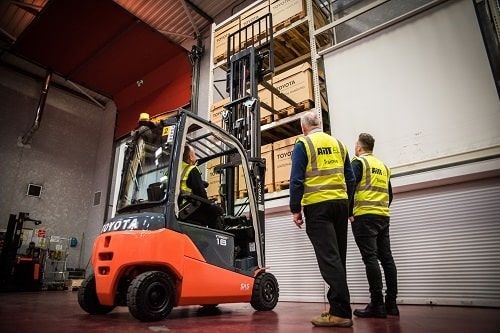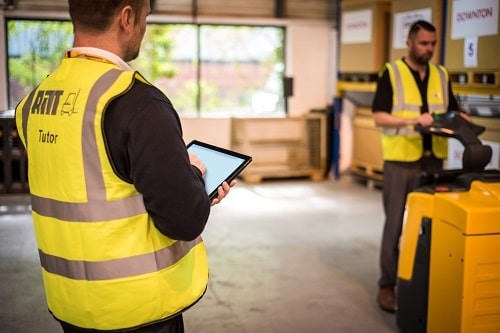Choosing an accredited provider of materials handling equipment operator training can reap benefits in terms of safer drivers and workplaces.
Features
Workplace transport: keep your standards high
Accredited training of those who operate materials handling equipment (MHE) – like forklifts, sideloader machines and vertical stock pickers – is an unparalleled success story. Just as the testing regime has been transformed to bring unprecedented rigour, relevance and consistency, pass rates have also risen dramatically.
In almost every respect, things on the MHE training front could not be better. But the key word here is ‘almost’ since, right now, there is a severe shortage of instructors to provide the training to operators.
The reasons for this are similar to those facing other sectors, including the combined effects of Brexit and Covid (which saw large numbers of older employees take early retirement). The rise of online shopping has also fuelled massive growth in the use of MHE across the supply chain, increasing demand for instructors to be available to train the increasing number of machine operators required by businesses. At the same time, businesses have been forced to recruit new staff to replace overseas MHE operators who are no longer entitled to work in the UK.
 Accredited training of those who operate materials handling equipment (MHE) – like forklifts, sideloader machines and vertical stock pickers – is an unparalleled success story. Photograph: AITT
Accredited training of those who operate materials handling equipment (MHE) – like forklifts, sideloader machines and vertical stock pickers – is an unparalleled success story. Photograph: AITT
All of this has created huge pressures on the supply of MHE operator training and has seen AITT (the Association of Industrial Truck Trainers) working closely with all parties to help managers plan ahead to focus on delivering operator training where it’s needed most.
One positive that appears to have emerged from the pandemic, however, is a greater emphasis on measures that protect staff and keep them safe. Indeed, there is evidence of an increased recognition by businesses that a lack of high-quality training for MHE operators inevitably proves far more costly in the long run.
So what kind of things are changing in the world of MHE training, how will this affect managers and supervisors, and what can a business do to stay ahead of the game?
The numbers speak for themselves
Since the formation of the ABA (Accrediting Bodies Association for Workplace Transport), the accredited training bodies for workplace transport (AITT, RTITB, ITSSAR, LANTRA and NPORS) have worked closely together, and with industry as a whole, to ensure:
- More accurate and appropriate categorisation of equipment
- Greater consistency of testing standards for MHE operators and instructors across all types of equipment
- Tougher testing of candidates (both MHE operators and instructors)
- Greater accessibility of records to help employers check the qualifications of MHE operator
As to whether it’s working, the latest figures from a leading, AITT-accredited MHE operator training provider speak for themselves: a pass rate of 98 per cent for operators in the popular B1 category (counterbalance forklift trucks).
 A key change in the testing regime for MHE operator training has been to target habitual bad practice. Photograph: AITT
A key change in the testing regime for MHE operator training has been to target habitual bad practice. Photograph: AITT
This would be a remarkable statistic at any time but coming just five years after a complete overhaul of the entire operator testing regime – making it far tougher – the figure is a testament to the quality of the individual training company and to the benefits that come from being accredited as a provider of MHE operator training with a workplace transport training accrediting body like AITT (see panel below for an explanation of what AITT does).
Tougher testing
A key change in the testing regime for MHE operator training has been to target habitual bad practice. In short, those repeatedly committing the same safety-related fault automatically fail the test’s practical element and will require further training.
In broad terms operator testing now addresses four key aspects:
- Pre-use inspection: elements of the pre-inspection of the MHE the operator must undertake before using the equipment are now mandatory. Previously this was not the case
- Heavier penalties: certain serious faults carry penalties of five points.
- If a candidate incurs more than three five-point penalties in any one category, it will be an automatic fail
- Tougher scoring: increases in penalty points from three to five have made it easier to accrue more than 40 penalty points, and, therefore, fail the test
- Theory: although a number of questions remain the same, the number of possible answers to multiple-choice questions has increased from three to four, to
make the test more stringent and challenging. Also, five of the questions are mandatory and therefore must always be included when testing an operator’s knowledge at the end of a training course. There are 20 multiple-choice questions, 10 of which are safety-related and 10 operational.
Importantly, these same criteria form the basis of the testing standards for workplace transport categories when they are updated, ensuring greater clarity and consistency.
Testing standards are often updated to align with the latest legislation and best practice, and to ensure that all accrediting bodies test to the same parameters. That is set to continue in 2023 when testing standards for mobile elevating work platforms (MEWPs) will be updated.
Clarifying categories – why this matters
Reflecting on the increasingly diverse range of MHE on the market, recent years have seen a number of changes to the way forklift and warehouse trucks are categorised.
Accrediting bodies like AITT are working hard to not only publicise these changes, but also to overcome persistent myths that put operators at risk.
A good example concerns pedestrian and rider-operated pallet trucks. These are found in their tens of thousands in warehouses and workplaces throughout the UK, but people overlook how potentially dangerous they are and how many injuries they cause. Indeed, many employers still cling to the notion that no formal training is required to operate them.
This simply isn’t true and failing to provide appropriate training can result in large fines – for example, if an untrained operator injures themselves or others due to their lack of knowledge of safe working practices. Those employers who need convincing should type ‘Supermarket fined after powered pallet truck accident’ into a web search engine and they will see the financial cost to the business concerned – and the associated reputational damage.
 Liam Knight, managing director at AITT
Liam Knight, managing director at AITT
Accredited training really works
Although there is no reliable data available to enable direct comparisons, anecdotal evidence suggests that workplace transport training companies that are not accredited by an ABA member fall well short of the 98 per cent pass figure for forklift truck operators mentioned earlier. But the benefits of a business choosing to purchase MHE operator training from an accredited provider go well beyond simple pass or fail rates.
There is a quality control aspect that runs through everything. Training providers accredited to AITT, for example, are annually audited to ensure they have the correct policies, procedures and support in place for their instructors. AITT believes this is fundamental to maintaining the highest levels of competence among MHE instructors – and in turn ensuring they provide high quality operator training.
When a business decides to only use an accredited MHE training provider, this should also ensure continuity, because the customer can be assured that the quality and content of the training will remain high from one year to the next, regardless of the individual trainer employed by the training company. Only using accredited MHE training providers also means a business can be assured of consistency in the quality of training provided throughout the UK. This is essential for organisations operating across multiple sites and locations who need to be certain they will receive the same quality and standard of operator training and testing at any location across the country.
You’ll never work alone
It’s important to remember that by working with an accrediting body you never work alone. An accrediting body will offer the guidance and resources you need to ensure you’re working in line with the latest best practice procedures and official guidelines.
This will include up-to-date documentation and legislation to guarantee that training will always be consistent.
In short, whether you’re a training provider, recruitment agency, employer or equipment user, you will find relevant information, practical tips and essential advice to support you now and in the future.
Key points
- Use an MHE operator training provider that is accredited by an ABA member to ensure quality, consistency and accuracy of support
- Keep up-to-date on the various categories for different types of MHE (an accrediting body can advise on this) to stay abreast of legislation and training requirements, especially for new equipment and for new starters
- Plan training as far ahead as possible: lead times have grown by around 50 per cent
- Never take an interviewee’s word for it! Contact the appropriate accrediting body to verify the authenticity of operator qualifications such as certificates
Plan for price increases. The shortage of instructors is being compounded by steeply rising costs – so higher chargers are inevitable - Prioritise: make sure new starters are properly trained before they ever touch a forklift
- Re-assess in order to ensure that those MHE operators most in need of refresher training get it first.
What role does AITT play in ensuring the correct training of MHE operators and instructors?
AITT is a nationally-recognised accrediting body for workplace transport training. Using the guidance set out in the HSE Approved Code of Practice for rider-operated lift trucks (ACoP L117), AITT publishes guidance for the training of materials handling equipment operators, instructors, tutors and examiners.
Qualified AITT instructors (including companies that provide MHE operator and instructor training) can apply to become an AITT-accredited training provider.
AITT ensures that all AITT-accredited training providers are adequately audited and ensures the providers’ courses are externally verified. This is to ensure the training is being provided in line with the AITT’s standards and requirements.
AITT-accredited training providers must consistently maintain standards of training, beyond the required minimum. Also, all AITT-registered and accredited instructors and companies must allow independent monitoring of their MHE operator and instructor training.
AITT has its own operator registration scheme called ACORNS (AITT Certification of Operator Registration Number Scheme). This is a database of all the AITT accredited operator training that has been delivered by AITT’s registered training providers. The database contains over 300,000 candidate records (i.e. MHE operators that have successfully undergone and passed MHE training from an AIIT-registered training provider). ACORNS allows employers to check the validity of an MHE operator’s training certificate, by quoting the ACORNS number on the certificate.
For more information see: aitt.co.uk
Liam Knight is managing director at AITT
FEATURES

Why line managers play a vital role in workplace wellbeing
By Marcus Herbert, British Safety Council on 03 September 2023
The behaviours of line managers can have a positive or negative impact on employee health, wellbeing and engagement, so it’s vital managers get staff feedback on whether their management style is supportive or negative, and have regular check-ins so workers can raise concerns about their wellbeing.

Watercooler Event to hone in on eight trends in employee health and wellbeing
By Claire Farrow, Make a Difference Events & Media on 15 April 2024
The free-to-attend Water Cooler Event at ExCeL London on 23–24 April will see more than 6,000 workplace experts coming together to explore the latest thinking, solutions and best practice for supporting and boosting employee wellbeing, diversity and workplace culture.

Sedentary working and how to combat the ‘sitting disease’
By Gavin Bradley, Active Working on 05 April 2024
Prolonged and excessive sitting poses a major risk to our health, but the Get Britain Standing campaign and On Your Feet Britain Day on 25 April are a great way of encouraging workers to sit less and move more.



